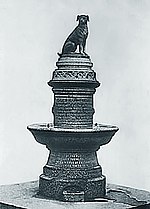Portal:London/Showcase article/01 2010

The Brown Dog affair was a political controversy about vivisection that raged in Edwardian England from 1903 until 1910. It involved the infiltration of University of London medical lectures by Swedish women activists, pitched battles between medical students and the police, police protection for the statue of a dog, a libel trial at the Royal Courts of Justice, and the establishment of a Royal Commission to investigate the use of animals in experiments. The affair became a cause célèbre that reportedly divided the country.
The controversy was triggered by allegations that, in February 1903, William Bayliss of the Department of Physiology at University College London had performed illegal dissection before an audience of medical students on a brown terrier dog—adequately anaesthetized, according to Bayliss and his team, conscious and struggling, according to the Swedish activists. The procedure was condemned as cruel and unlawful by the National Anti-Vivisection Society. Bayliss, whose research on dogs led to the discovery of hormones, was outraged by the assault on his reputation. He sued for libel and won.
